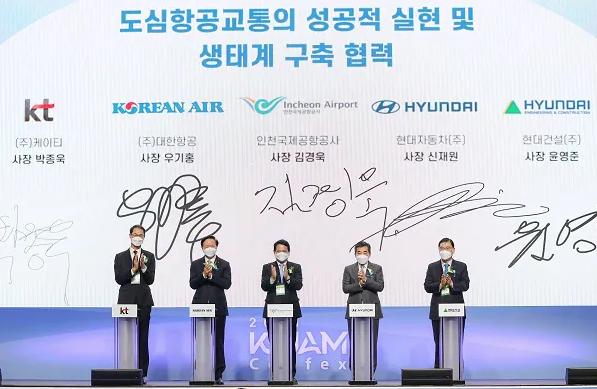Korean Air teams up with major companies to pioneer UAM in Korea

From left to right, Mr. PARK Jong-Ook, President of KT Corp; Mr. WOO Keehong, President of Korean Air; Mr. KIM Kyung Wook, President & CEO of Incheon International Airport Corporation; Mr. SHIN Jaiwon, President of UAM Division at Hyundai Motor Group; and Mr. YOON Young-Joon, President & CEO of Hyundai Engineering & Construction
Korean Air signed a Memorandum of Understanding (MOU) to develop Korean Urban Air Mobility (K-UAM) with Hyundai Motor Company, Hyundai Engineering & Construction Company, Incheon International Airport Corporation and KT Corporation on November 16.
The 5-organization consortium, forming UAM Team Korea, will work to build a UAM-friendly environment including raising social acceptance; expand UAM market opportunities; and jointly develop and promote a UAM business cooperation roadmap.
UAM is a next-generation mobility model that seeks to solve traffic congestion and combat climate change by transporting passengers and cargo within urban skyways. UAM’s global market worth is expected to reach about USD 1.5 trillion by 2040. With global competition making various efforts to lead the UAM industry, the Korean government formed the UAM Team Korea in June 2020 in a proactive effort to commercialize domestic UAM by 2025. The government is leading private sector cooperation as it pushes for the early stabilization of Korea’s urban air mobility.
Through the agreement, Korean Air and its partners plan to maximize their cooperation scope by fully utilizing their respective knowledge and expertise. Korean Air, with its extensive experience in passenger and cargo transportation, aircraft maintenance, and manned and unmanned aerial vehicles development, will contribute through developing an UAM operations and control system, conducting traffic management groundwork from an airline’s perspective, and research and testing of passenger and logistics business models.
Hyundai Motor Company will support UAM aircraft development, its commercialization and test flights. Hyundai Engineering & Construction Company will design and construct vertiports and mobility hubs that will connect ground transportation to the skyway. Incheon International Airport Corporation will build UAM infrastructure, test vertiport operations and research traffic management. KT Corporation will develop communication infrastructure and business models for air-to-ground connectivity.
Korean Air plans to create a foundation for UAM in Korea by developing a suitable business model while actively establishing UAM operations, control and traffic management systems, and providing integrated operation services to open up the city skyways.
